July 2022 2nd Edition
July 2022 2nd Edition vuyelwan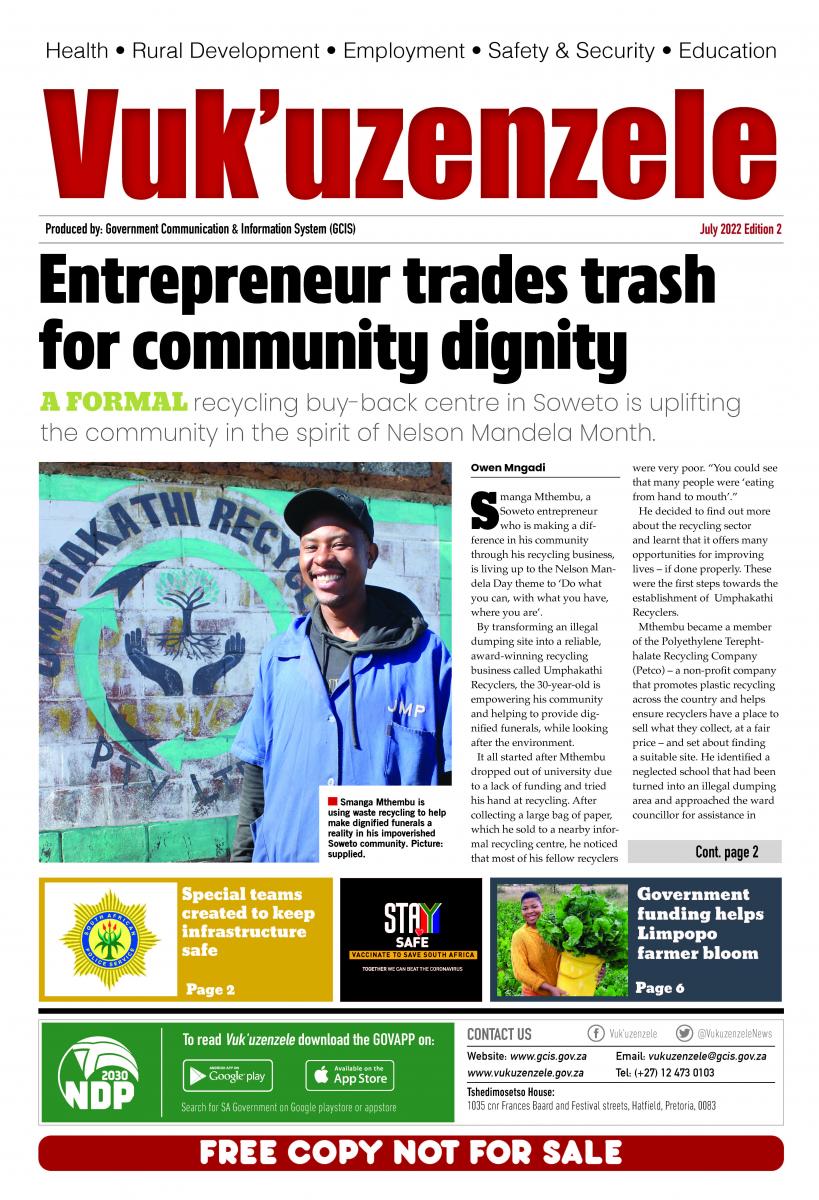
English PDF version
Translations
Afrikaans
isiNdebele
isiXhosa
isiZulu
Sepedi
Sesotho
Setswana
Siswati
Tshivenda
Xitsonga
COVID-19 regulations cancelled
COVID-19 regulations cancelled vuyelwanHealth Minister, Joe Phaahla recently cancelled COVID-19 regulations relating to the wearing of face masks, gatherings and persons entering the country.
The regulations were promulgated by the Minister on 4 May in the Regulations Relating to the Surveillance and the Control of Notifiable Medical Conditions. President Cyril Ramaphosa in a national address in April said the regulations would be eased gradually.
The gazetting of the regulations means that the wearing of face masks in any public-use indoor space or when on public transport is no longer required.
On gatherings, people congregating in public spaces will no longer be limited to certain numbers.
The regulations stipulated that a maximum of 50% of the venue capacity may be occupied, provided that every attendee must be vaccinated against COVID-19 and produce a valid vaccination certificate. Alternatively, they could produce a valid certificate of a negative COVID-19 test obtained not more than 72 hours before the date of the gathering.
Regarding limitations on people entering the country, the regulations required that any person entering the country be vaccinated against COVID-19 and produce a valid vaccination certificate.
Alternatively, this group of people needed to produce a valid certificate of a negative PCR COVID-19 test not older than 72 hours before the date of departure.
Minister Phaahla reminded South Africans of the importance of vaccinating for COVID-19.
“We just need to end with caution that the COVID-19 virus is not yet gone; it is still in our midst; we are just stronger than before, especially with vaccination, and we urge those not yet vaccinated to come forward and those due for boosters to also come forward,” he said.
The Minister added that the vaccination program will remain and is now being integrated into normal health services.
“We urge all leaders of society and organisers of events to work with our health workers to promote healthy lifestyle and know your status, which is - blood pressure, blood sugar, cancer, HIV and COVID-19.” –SAnews.gov.za
Entrepreneur trades trash for community dignity
Entrepreneur trades trash for community dignity vuyelwanA FORMAL recycling buy-back centre in Soweto is uplifting the community in the spirit of Nelson Mandela Month.
Smanga Mthembu, a Soweto entrepreneur who is making a difference in his community through his recycling business, is living up to the Nelson Mandela Day theme to ‘Do what you can, with what you have, where you are’.
By transforming an illegal dumping site into a reliable, award-winning recycling business called Umphakathi Recyclers, the 30-year-old is empowering his community and helping to provide dignified funerals, while looking after the environment.
It all started after Mthembu dropped out of university due to a lack of funding and tried his hand at recycling. After collecting a large bag of paper, which he sold to a nearby informal recycling centre, he noticed that most of his fellow recyclers were very poor. “You could see that many people were ‘eating from hand to mouth’.”
He decided to find out more about the recycling sector and learnt that it offers many opportunities for improving lives – if done properly. These were the first steps towards the establishment of Umphakathi Recyclers. 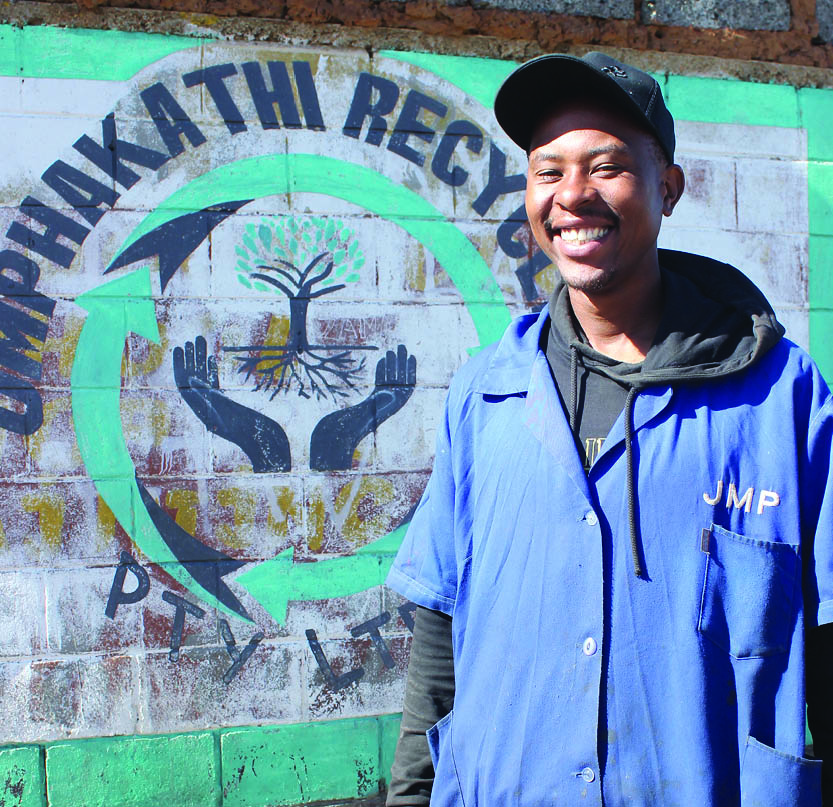
Mthembu became a member of the Polyethylene Terephthalate Recycling Company (Petco) – a non-profit company that promotes plastic recycling across the country and helps ensure recyclers have a place to sell what they collect, at a fair price – and set about finding a suitable site. He identified a neglected school that had been turned into an illegal dumping area and approached the ward councillor for assistance in securing the site.
The City of Joburg agreed to clean up the school so that Mthembu could start his recycling centre. “It was a mammoth task, given the extent of the damage,” he says.
The assistance from the municipality marked a turning point for Mthembu – he managed to convert the old facility into a fully functional recycling centre for glass, paper and plastics. The centre was soon supported by community members who brought in loads of recyclables for cash, which also improved the environment of the township.
Burial scheme
One day, an elderly woman who brought in her recyclables started to cry because she could not afford a funeral for her son. Moved by her plight, Mthembu came up with a plan to help people in the same situation.
He launched the Umphakathi Recyclers Burial Scheme. Its members bring in recyclables and in the event of a loved one’s death, they can claim for funeral related equipment needed to provide a dignified send-off, including tents, tables, chairs, gas stoves, pots, mobile toilets, a mobile kitchen and plates.
Umphakathi Recyclers has so far created permanent employment for six people, while the burial scheme covers 438 households.
Award-winning philosophy
The company was a joint winner of the Best Community Recycling Initiative in the recent Petco Awards. This national environmental awards initiative recognises excellence in reuse, recycling and waste minimisation among businesses, organisations, community groups and individuals within the plastic industry.
In 2021, Mthembu received R400 000 after winning a South African Breweries Foundation Social Innovation Award.
In the spirit of struggle icon Nelson Mandela, Mthembu believes that without communities to support them, businesses would not succeed. “Without my neighbours, I would never have managed to get my recycling business going,” he says.
He now hopes to grow his business to create additional jobs for young people in his community.
“If you have a vision, never give up,” is his advice to entrepreneurs. “It is not going to be easy, but it will be worth it. I never thought it was possible, but it was – through hard work.”
He says he is proud of the impact his businesses have on the community. “People can afford to buy bread, and we ensure that everyone receives a dignified funeral, regardless of their social class.”
His Mandela Month message is: “Let’s save the environment. Let’s create jobs. Let the community prosper.”
For more information contact SAB on www.sabfoundation.co.za
For more information on starting a business visit www.seda.org.za
Entrepreneur's journey from failing to flourishing
Entrepreneur's journey from failing to flourishing vuyelwanSuren Gopi (51), the sole owner of filtration supplier Zululand Filters, is giving more established companies a run for their money after securing two big contracts.
After an unprofitable start, Gopi approached the Small Business Enterprise Agency (SEDA) and was given the support he needed to turn his business around. Zululand Filters is now doing so well that it recently secured long-term contracts with two big Richards Bay companies, South 32 and Rio Tinto subsidiary Richards Bay Minerals. The company also provides emission services to Tongaat Huletts and Mondi.
With clients in the mining, manufacturing, automotive, power generation, shipping and consumer markets, Zululand Filters supplies emission solutions, refrigeration, ventilation and filters.
It took Gopi almost a decade to get Zululand Filters profitable after buying it on auction in 2009. At the time, it was the only business that provided emission solutions, filters and refrigeration in the north of KwaZulu-Natal, says Gopi. 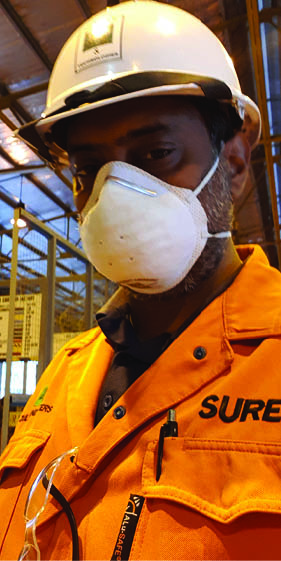
While Gopi thought that the business would do well because there was little competition and it was established, he did not realise that it owed millions to its customers and the South African Revenue Service, says Gopi.
“I had hoped that I would use my expertise [as a maintenance engineer] to revive the business, but it was not an easy journey. It had a bad reputation as it had failed to honour its contractual obligations. We had to rebuild credibility and clear all the debt,” he says.
After years of operating at a loss, Gopi says in 2018 he participated in the Enterprise Coaching Programme facilitated by SEDA, which offered basic business management training.
He says SEDA helped him put a proper business plan together, with 10-year goals. They also helped him identify market opportunities, develop a proper website.
Gopi says after the intervention, his business began growing. New services were offered, which created job opportunities. He says turnover increased from R14 million to R17 million and his employees increased from 26 to 46.
He also received advanced enterprise coaching from SEDA, which covered all aspects of business, including e-marketing.
“I also got to attend the trade mission to Mauritius in 2018,” he adds.
SEDA provides non-financial support to small enterprises and cooperatives. It has offices nationwide and works with municipalities. Emerging businesses can visit any SEDA for assistance.
Visit www.seda.org.za for more information.
Exciting journey ahead for tech-savvy entrepreneurs
Exciting journey ahead for tech-savvy entrepreneurs vuyelwanTwenty entrepreneurs who have come up with new technologies that will help the tourism sector grow and create jobs will be given the wings they need to fly, thanks to the recently launched Tourism Technology Grassroots Innovation Incubator Programme.
The programme is run by the Department of Tourism in collaboration with the Technology Innovation Agency (TIA), an entity of the Department of Science and Innovation.
Over the next two years, the 20 entrepreneurs will receive grant funding and be given the support they need to develop their idea so that they can be introduced to the tourism sector and to potential investors.
The innovators, aged between 18 and 35, were selected based on the ability of their innovations to address the needs of the tourism sector, with an emphasis on digital and green technologies. 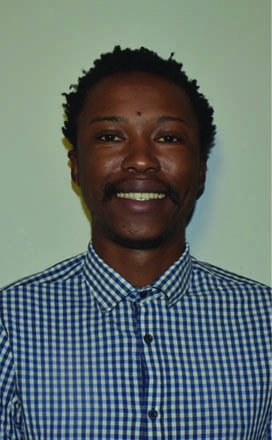
One of the participants is Mpumalanga-born Nkululeko Nkosi (27), who is the co-founder of a digital agency called Saturated. He was selected for the programme after coming up with Travelocal, a platform that offers tourism, travel, hospitality and entertainment business people an opportunity to advertise and sell their products and services to customers.
He says at the moment, various platforms offer event ticketing, hospitality offerings, tours and accommodation bookings. He believes it would be easier for people to find information if everything was on one platform, rather than many different ones.
“Right now, we are learning as much as possible from mentors, the market, competitors and the state agencies involved in this incubation programme.”
 Kyle Brijder (26) from the Western Cape was chosen for his innovation called Tripa, which is a marketplace platform connecting travellers and registered freelance tourist guides. The platform enables travellers to create their own tour packages and to be connected with the relevant tourist guide.
Kyle Brijder (26) from the Western Cape was chosen for his innovation called Tripa, which is a marketplace platform connecting travellers and registered freelance tourist guides. The platform enables travellers to create their own tour packages and to be connected with the relevant tourist guide.
“As a traveller, I found it frustrating that I could not create my own tour experience without having to go back and forth with a travel agent or choose options from a list. I wanted to create my own tour itinerary and have a local guide take me to the various stops. Similarly, as a registered guide myself, I know first-hand how hard it is to get work as a freelancer.”
According to Vusi Langa, the Head of Marketing and Communication at TIA, applications for future incubator programmes will depend on the completion and success of the current pilot programme.
Government funding helps Limpopo farmer bloom
Government funding helps Limpopo farmer bloom vuyelwanIt has taken Cynthia Mokgobu (29) only three years to grow her business from a small vegetable garden in her backyard to a successful three-hectare farm in Bochum, Limpopo.
After obtaining a Diploma in Ornamental Horticulture from UNISA and commencing a horticulture internship, Mokgobu decided to drop out of the programme and start a small vegetable garden in her backyard.
Three years later, she now supplies local markets with spinach, butternut, baby marrows and cabbages. 
“Through Mosibudi Trading Enterprise, we now supply stock to Boxer Superstores, Spar Savemor, Bochum Market and Galito’s Bochum. I also recently joined the small grower programme with Potato SA,” she says.
Mokgobu’s farming journey has been supported by the Limpopo Department of Agriculture and Rural Development (LDARD).
“When I started, the department helped me establish a business plan, showed me how to keep my records and helped me build a good profile for Mosibudi. The officials also showed me how to apply for funds from the department.”
In 2020, when the COVID-19 pandemic hit, the department granted her R35 000 as part of the COVID-19 relief fund. In 2021, she received a R50 000 voucher to support her business.
“The funds were used for fertilisers and chemicals. I was able to keep my business afloat and produce more, despite the tough financial year.”
Mokgobu is now using her skills to help other farmers. “I hold online skills development meetings with emerging farmers who don’t have agriculture background and not privileged enough to study agriculture. The aim is to empower them with product knowledge and skills so they can apply them when they start their farming journey.”
Apply for funding
The LDARD is again calling on subsistence, smallholder, commercial and organised farmers and producers to apply for funding for infrastructure, production and mechanisation for the next financial year.
Farmers can get support for poultry, fruit and vegetables, general livestock, soil preparation, fertiliser application and plant spraying, and subsidies for tractors and equipment.
To apply, download the application form at www.ldard.gov.za, complete it and submit it to your LDARD local office before 30 July.
For more information, call LDARD at 015 294 3000.
Government wants young people to start their own businesses
Government wants young people to start their own businesses vuyelwanVarious government programmes offer funding and guidance to help young people start or grow their businesses.
State institutions, such as the National Empowerment Fund (NEF), the Industrial Development Corporation (IDC) and the Small Enterprise Development Agency (SEDA), exist to promote small business development.
They shared more about their youth-focused products during the recent Youth in Industries: Enterprise Development Support and Access to Markets webinar hosted by the Department of Trade, Industry and Competition.
NEF
Nomazizi Siphondo, the Investment Associate at the NEF, said the NEF offers low-interest loans to small businesses wanting to expand and to people wanting to start a business. 
“This is to make sure that we are not killing newer businesses before they’ve taken off,” she said.
The NEF also offers business skills training.
For further information, visit www.nefcorp.co.za/funding-solutions/funding-instruments or call 0861 843 633.
IDC
The IDC’s Manyatsa Nkutha outlined the funding offered to youth-owned businesses in a wide range of sectors, including mining, agriculture, chemicals, industrial infrastructure, clothing, manufacturing and IT.
The Gro-E Youth scheme provides funding of between R1 million and R50 million to businesses owned by young people, he says. The interest rate is very attractive.
The Small Business Finance Unit funds projects of between R1 and 15 million.
SME Connect helps young people prepare business plans and offers other business support.
For more information, visit www.idc.co.za. Click on ‘funding solutions’ and then ‘special schemes’. Alternatively, call 0860 693 888.
SEDA
Andrew Bam of SEDA said the agency is committed to letting people know that they do not have to work for a boss, but can instead start their own business. He said SEDA wants to get this idea out to young adults who have finished their education and to those who are still studying.
SEDA’s Centres for Entrepreneurship and Rapid Incubator models run at technical and vocational education and training colleges around the country, he said. These incubator programmes help students launch their own businesses.
For more information on SEDA’s offerings, go to www.seda.org.za or call 0860 103 703.
Learnership programme ensures job creation
Learnership programme ensures job creation vuyelwanAspiring commercial poultry farmer Mandisa Gumede (29) used a portion of her Wholesale and Retail Sector Education and Training Authority (W&RSETA) learnership stipend to open her chicken start-up.
In 2019, when Gumede’s parents could no longer afford to pay for her maritime industry studies, she was unemployed and frustrated.
“My dad found out about a one-year learnership programme with the W&RSETA. I didn’t think twice, I applied,” she says.
Gumede, from Umlazi in Durban, began the programme in August 2020. She saved R500 a month of her R2 950 monthly stipend until December. In January 2021, she was able to start her business. 
“I bought about 50 broiler chicks but lost almost all of them. Starting again was difficult so now I buy 40 to 60 five-week-old birds at a time, grow them for three weeks and sell them. It’s going well and I’m making a profit as I have established customers.”
She says she is grateful for the learnership and the stipend. “Without it, I wouldn’t be where I am today. I am not where I want to be, but I’m on the right path. It wasn’t easy. The learnership helped me in a big way. I’m really grateful,” she says.
Gumede now hopes to grow the business and create jobs for youth. “I’m running the operation with my younger brother. Even though I am running it from home, the aim is to get a bigger space. I just want to get to a point where I can get a plot and scale up,” she says.
W&RSETA support
The W&RSETA offers education and training development opportunities to help people improve their skills and increase employment opportunities. It mainly offers learning and skills programmes, from NQF Level 1 to management level, through its registered companies.
The SETA also provides bursaries towards wholesale and retail qualifications from NQF Level 5 upwards.
For more information and to apply for assistance from the W&RSETA, visit www.wrseta.org.za
Monkeypox in South Africa
Monkeypox in South Africa vuyelwanHealth Minister Dr Joe Phaahla has confirmed that Monkeypox has been detected in South Africa during a recent media briefing in Pretoria, Gauteng.
He said he received a report from the National Health Laboratory Services (NHLS) that they have confirmed Monkeypox in South Africa through laboratory tests.
The virus has been detected in Gauteng and the Western Cape.
Monkeypox is usually a mild disease manifesting as blisters or sores on the skin. It is usually mild and with a fatality rate of 1 percent.
The disease has previously been reported in African countries such as Nigeria, Democratic Republic of the Congo, Central African Republic and Ghana in the early 2000s. 
The current outbreak is dominated by high numbers in Europe with the UK leading with over 700 cases, Spain with just over 500, followed by Germany, Portugal and France.
The Minister said the National Institute for Communicable Diseases (NICD) is conducting online in-service training for health workers to be able to detect the disease so that necessary laboratory tests can be done.
“The disease only spreads through close contact, so you cannot get it by being in the same room with an infected person,” the Minister said.
Minister Phaahla assured South Africans that Monkeypox is not a virus which has never been seen before and scientists have information about it.
Chairperson of the Ministerial Advisory Committee (MAC) on COVID-19 and Executive member of NHLS, Professor Koleka Mlisana, said Monkeypox is a disease that is endemic in Central and Northern Africa which has been known to be mild.
An endemic disease is a condition regularly found among particular people or in a certain area.
She said there are similarities between Monkeypox and Smallpox.
“There are vaccines and treatment available for Monkeypox. The disease presents itself with flu like symptoms and Legionnaires. The important thing is that somebody who comes up with a clinical picture is easy to diagnose and most importantly it is difficult to transmit, unlike a respiratory virus, because it is by contact. You would only get it when you have come in direct contact with somebody who is infected,” she said.
Legionnaires' disease is a severe form of pneumonia.
Professor Mlisana said contact tracing is important in this case and the Health Department will continue to do that.
She assured South Africans that the Laboratory infrastructure has all the adequate resources to be able monitor any new infections that may arise. –SAnews.gov.za
NSFAS to spend R47.3 billion in student funding
NSFAS to spend R47.3 billion in student funding vuyelwanThe National Student Financial Aid Scheme (NSFAS) will in the 2022 academic year spend R47.3 billion funding the tertiary education of 691 432 students.
This was recently revealed by Higher Education, Science and Innovation Minister Blade Nzimande during a press briefing in Pretoria, Gauteng.
Of the approved applicants, 462 983 are female and 227 072 are male. 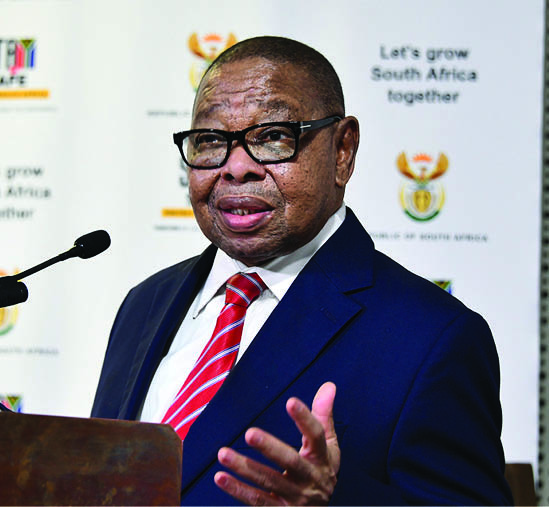
Addressing reporters, the Minister said: “There has been a new intake of 240 790 SASSA students… and we will continue to support 1 770 students with disabilities who receive quite a comprehensive set of allowances from the NSFAS Fund.”
Of this allocation, he said, 362 482 is for continuing students and 136 460 for new students.
He said that students registering at multiple institutions continue to be a challenge.
“We have found that 2 481 students have registered at more than one institution and NSFAS has received registration claims from more than a single institution,” he said.
To rectify this problem, students are required to deregister at institutions that they are not studying at and submit evidence to NSFAS so that funds can be released to the correct institution.
TVET college student sunding
Minister Nzimande added that for 2022, NSFAS projected a 10% growth in student numbers across all technical vocational and eduction training (TVET) academic cycles to an estimated 395 000 students. In this regard, NSFAS made provisional funding available for 380 000 TVET college students.
To date, he said NSFAS received registration data for close to 200 000 students. This is at about 52% of expected and provisionally funded students in colleges, he said.
“In seeking to close the gap and understand the issues at college level, NSFAS deployed its staff in May to assist TVET colleges to submit registration data according to NSFAS requirements.
The Minister said there is a need to capacitate TVET college staff on NSFAS processes. In this regard, he said NSFAS has committed to support colleges with a contribution of R500 000 per college in the short-term, to appoint financial aid officers.
“There were 4 287 unprocessed students not processed for payment by NSFAS because of these exceptions. NSFAS has started a reconciliation and data sharing exercise with institutions for the resolution of these identified exceptions,” he said.
Minister Nzimande added that his department is inundated by student complaints about accommodation and being evicted by landlords. He said from next year, NFSAS will take a proactive role in NSFAS-funded student accommodation to ensure value for money. –SAnews.gov.za
For more information about NSFAS log on to www.nsfas.org.za
NYDA training ensures success for pig farmer
NYDA training ensures success for pig farmer vuyelwan
Pig farmer Dinewo Ntshanana (25) is one of the many entrepreneurs who have been assisted by the National Youth Development Agency (NYDA) to get her business off the ground.
Ntshanana, the owner of a piggery in Middelvlei, Randfontein, applied for NYDA grant funding after taking part in the agency’s seven-day business management training course.
She used the funding to buy medication, feed, disinfectant and personal protective equipment for her business, Umbuso Wakho Farming, which has 2.5 hectares of land. 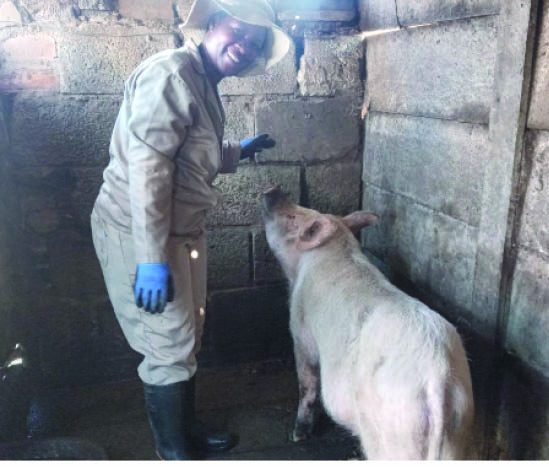
“We breed our pigs, mainly Landrace and Large White, naturally,” says Ntshanana, who studied Primary Agriculture NC(V) at the South West Gauteng Technical and Vocational Education and Training College.
She aims to grow her pigs as organically as possible, to ensure that she also caters for people who have food allergies.
She says she chose pig farming because it is a profitable business in South Africa. “Pigs have a high production rate… One sow, depending on her breeding levels, can give birth to up to 16 piglets at least twice a year, and pigs only take seven to eight months to mature.”
To make her farm as sustainable as possible, Ntshanana uses pig manure to fertilise the strawberries that she also grows on the farm. These are sold to nurseries and private individuals.
Ntshanana is enjoying her farming journey. “Learning how the pigs react to different conditions and how they live helps me understand them a bit more. This helps me to provide a better environment for them to reproduce naturally and avoid health complications.”
While she admits it can be challenging at times, as she has to ensure that the pigs are well fed and that she has medication in case of illness, her passion and dream to make life better for herself and her family keep her motivated.
Ntshanana has two part-time employees, but says she does most of the work as the farm is still in its infancy.
Her advice to aspiring farmers is to have patience. “Having a mentor or experienced person around for advice and guidance is helpful.”
Our nation mourns the young lives lost in Enyobeni tavern tragedy
Our nation mourns the young lives lost in Enyobeni tavern tragedy vuyelwanFrom The Union Buildings
A few weeks ago the families of a township in Scenery Park outside East London, received news that every parent prays they never get to hear.
They were told that 21 of their children had been found dead, in a tavern. The youngest child was only 13 years old.
The police investigation into the tragedy is proceeding apace. Flowing from the investigations, the Buffalo City Metro is looking into whether the tavern violated any municipal regulations.
Our thoughts and prayers are with the families who are struggling to come to terms with this unspeakable horror.
We commend the Eastern Cape provincial government for assisting the affected families, as well as AVBOB that has pledged to assist the families with the burials.
Even as the relevant authorities deconstruct what happened to ensure there is justice for the victims, there is a conversation we do need to have as a country. It is the problem of under-age drinking. 
The footage and images posted online of the so-called ‘pens down’ party at the venue that night show revelling youngsters clutching bottles of alcohol. Many of those in the images look barely out of their teens.
A number of young people from Scenery Park have told the media of having seen a post circulated on social media, offering free rounds of alcohol to all who attended the event that night.
The increased social acceptability of young people drinking alcohol has become a serious problem in a country where the majority of the drinking population are already classified by the World Health Organization as binge drinkers.
Alcohol use amongst adolescents is associated with impaired function, absenteeism from learning, alcohol-related injuries, suicidal thoughts and attempts, and risky behaviour.
We must come together to combat this vice that is robbing our young people of the best years of their lives, and making them susceptible to alcohol addiction.
As families it means having open and frank conversations about alcohol and setting boundaries. Children under the age of 18 consuming alcohol is against the law.
As adults we should refrain from practices such as sending minors to buy alcohol for us or capitulating to requests to buy these young people alcohol.
It is not the first time we have been confronted with tragic events such as what happened in Scenery Park last week.
A common denominator between Enyobeni tavern, the Throb nightclub disaster in Durban in 2000, and the Osi’s tavern tragedy in Khayelitsha in 2015, is that these establishments were selling liquor to minors.
The proliferation of establishments openly flouting the law points to failings on the part of authorities to enforce regulations.
Under the National Liquor Act, owners of establishments with liquor licenses may not sell alcohol to anyone under the age of 18. They must also take reasonable steps to ensure anyone they are selling alcohol to is of age.
We call on communities to work with authorities to ensure that taverns, shebeens, entertainment venues and outlets breaking the law face the consequences.
We call upon our police to step up the enforcement of laws that prohibit the sale of alcohol close to schools and enhance monitoring of outlets to ensure alcohol is not being sold to minors.
Another reality is that alcohol is a form of escapism for young people in communities were opportunities for safe and age-appropriate recreation are few.
The Scenery Park community has pointed to the lack of sports, learning and other developmental facilities for young people, leading them to resort to ‘tavern hopping’.
In the wake of the tragedy, the community has pointed out that there are no viable sports grounds, community libraries or youth centres in Scenery Park.
As government at national, provincial and local level we need to respond to the pleas of this community and those of other communities by developing more recreational spaces, facilities, programmes, and projects for our young people in disadvantaged areas in the province.
Other social partners such as the business community should also assist with sponsorship.
As communities we must work with our Community Policing Forums, with our civics organisations and with our school governing bodies and play a more active role in the lives of our children and in ensuring their safety and well-being.
As they say in our African indigenous classics “it takes a community to raise a child”.
Let us work together to protect our precious future generation from the ravages of alcohol and drug abuse and their effects.
Let us work together to ensure that those who put profit before the lives of our children are not allowed to operate.
Let us also set a positive example in our own relationship with alcohol.
Let us be keepers of not just our own children, but our neighbours’ children as well.
School aquaponics programme helps to alleviate hunger
School aquaponics programme helps to alleviate hunger vuyelwanLesedi La Kreste Anglican Primary School in Orange Farm is helping to alleviate hunger in its community through aquaponics.
Aquaponics, a food production system in which fish are raised in tanks of water where plants are also grown, is being used by the school to provide fresh, top-quality fish and vegetables.
The school built its first aquaponics system in 2011 and recently upgraded it to include a greenhouse, more grow beds, a new pump and a seedling nursery. 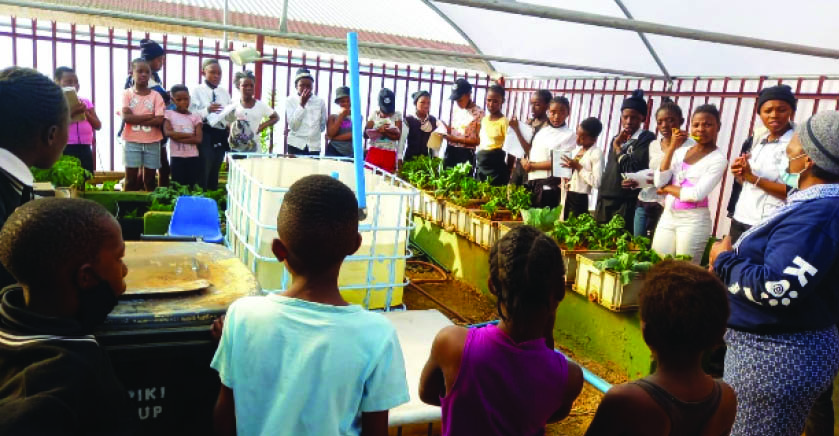
The teacher responsible for the project, Pinkie Motlanyane, says aquaponics is convenient, as more crops are produced in a smaller space. “It also saves time and water because the system runs by itself and no watering is required, and it provides learners with knowledge and skills for a different kind of farming.”
Over the years, the project has become more popular among pupils.
“It was initially part of the activities done by a small group of learners in the Environmental Awareness Club, which focuses on recycling, cleaning and greening our school. We have grown to include about 70 students from Grades 1 to 7, divided into two groups of seniors and juniors. Each group attends lessons every Wednesday for an hour,” Motlanyane explains.
“The learners seem to develop a level of emotional intelligence through caring for plants and animals. It also provides an opportunity for practical learning, instead of only theory.”
Feeding the community
According to Motlanyane, the project now contributes to the school’s feeding scheme and can also offer its harvest to the school’s immediate community.
“The vegetables help to alleviate poverty as the kids can sometimes take them home. The greenhouse expansion has also enabled parents to take part and volunteer,” she says.
Motlanyane encourages other schools to embark on a similar journey. She says aquaponics can provide sustainable food security and innovative agricultural education to learners and communities. It is interactive, educational and exciting for everyone, she adds.
Special teams created to keep infrastructure safe
Special teams created to keep infrastructure safe vuyelwanRampant rail and other infrastructure crimes, which cost billions of rands in losses, could be a thing of the past in KwaZulu-Natal following the launch of the Specialised Multi-Disciplinary Economic Infrastructure Task Teams (EITTs).
It is hoped that this South African Police Service initiative will help stop gangs from causing delays and destruction on construction sites and also prevent infrastructure theft, such as cable theft – all of which negatively affect the economy of the country.
In recent years, South Africa’s rail infrastructure has fallen prey to criminal syndicates, compromising the safety of passengers and rail operators.
The EITTs will focus on:
- Non-ferrous metal theft (such as copper cable theft).
- Essential infrastructure crimes (such as tampering with, damaging or destroying infrastructure related to energy, transport, water, sanitation and communication services).
- Critical infrastructure crimes (such as pipeline fuel theft).
- Extortion at construction and/or economic sites.
- Combating illegal mining and illicit trafficking.
In his State of the Nation Address in February, President Cyril Ramaphosa said the ongoing damage to and theft of economic infrastructure has “damaged confidence and severely constrained economic growth, investment and job creation.”
The President said the country needs to confront the criminal gangs that invade construction sites and other business places and demand money from companies, saying this requires a focused and coordinated response. 
The Deputy Provincial Commissioner for Policing in KwaZulu-Natal, Major General Phumelele Makoba, recently launched the EITTs.
Addressing the launch at the Durban Central Police Station, Makoba urged all role-players to work together in an integrated manner to safeguard infrastructure and bring perpetrators to book.
“We are convinced that the perpetrators of these crimes are repeat offenders and we need to strike a blow to these criminal syndicates and bring an end to the theft and destruction of our essential infrastructure.”
The three task teams will be based in the Ethekwini, Umgungundlovu and King Cetshwayo districts where these crimes are most prevalent.
The teams are made up of members of the police, government departments, other law enforcement agencies, state-owned entities, cellular telephone providers and the Directorate for Priority Crime Investigation.
By working together in task teams under one command, these departments and agencies will be able to combine their recourses to better fight infrastructure-related crimes.
To report illegal activities related to infrastructure and any other crime call the South African Police Service on 10111.
